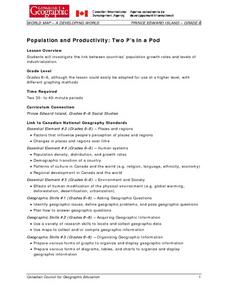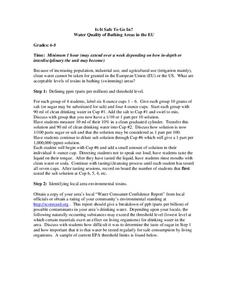K20 LEARN
If Our Classroom Were The World: Proportions And Percents
It's a small world after all. Classmates consider world population, languages, and religions in a cross-curricular instructional activity. Applying percentages and proportions, they determine what the class make-up would be if the class...
California Academy of Science
Rapid Brainstorming: How Can We Improve Our Global Food System?
In 2018, the average fast food burger cost $2.64 while a salad averaged $4.14. Does the price difference matter to public health? Scholars consider that question and others in a brainstorming session about improving our global food...
Curated OER
Balancing Act
Students investigate the dramatic increase in world population and the unequal distribution of resources. They examine the six world regions and how they are affected by the increase in population.
Curated OER
Word Population Problem
In this population learning exercise, students explore the population of the world. They determine the square miles that would be covered if the total population were standing in one spot. This one-page learning exercise contains 1...
Curated OER
Population and Air Pollution
Students conduct Internet research to compare the impact of increasing populations and how it affects air pollution in both, the USA and Russia. Students present their finding in a creative manner by developing brochures, bumper...
Curated OER
Human Population Growth
In this human population growth worksheet, learners create a graph of human population growth and predict future growth using the data given in a chart. Students identify factors that affect population growth.
Radford University
Is it Really a Small World After All?
Working in groups, learners research four countries' populations over the past 30 years. Using the data collected, the teams find regression equations that best fit the data. Taking the regression equations, they then make predictions...
Curated OER
Illuminating Climate Change: Connecting Lighting and Global Warming
Students analyze energy usage and connect energy usage to fossil fuel consumption. In this global warming and pollution lesson, students what fuels are used to generate electricity and how much CO2 each fuel produces, then graph the...
Curated OER
Global Warming: Life in a Greenhouse
Students investigate the evidence and consequences of global warming. They read and discuss an article, conduct a debate, evaluate their community's climate statistics, log their gas consumption for a week, and develop a panel discussion...
Curated OER
GLOBAL WARMING
Students form definitions of the greenhouse effect based on prior knowledge, class discussion, viewing diagrams, and participate in group brainstorming sessions and class discussions related to the impact of the greenhouse effect and...
Curated OER
Population Pyramid
Learners learn about demographic population pyramids. They then design and fictitious nation and draw its population pyramid.
Curated OER
Population and Productivity: Two P's in a Pod
Students investigate the link between countries' population growth rates and levels of industrialization. They observe that, over time, as a country becomes more industrialized, its population growth rate decreases.
Curated OER
World Population Study
Learners explore an exponential relationship and how it relates to human population growth and the current global population crisis. They graph both exponential and linear information.
Curated OER
WORLD POPULATION STUDY
Students explore an exponential relationship and how it relates to human population growth and the current global population crisis.
Curated OER
Invisible Invaders
Students research various epidemics that have devastated the world population focusing on the historical events taking place during the times of the epidemics and the epidemics' effects on these societies.
Curated OER
World Population
Young scholars examine the world population data using MyWorld GIS software and compare and contrast the population characteristics of countries around the world. Students summarize their findings in a report.
Curated OER
Understanding Human Population Growth
You can help students learn about the causes and consequences of our rapidly growing global population
Curated OER
Hunger in the World
Background information is a great tool for any teacher. This resource provides background information on nutrition and world hunger, as well as ten different activity options to help learners understand this global issue. Each activity...
Pulitzer Center
The Global Water Crisis
High schoolers examine the "quiet crisis," the lack of clean water, by reading articles and viewing video clips. They discuss the situations in Ethiopia, Yemen, Kenya, and Nepal. There are two options for the lesson, but one of them...
Curated OER
What Are We Going To Do About Baby Six Billion?
Students formulate and evaluate suggestions about government policy using demographic examples and projections. They examine websites and utilize worksheets imbedded in this plan.
Curated OER
World Cities of 5 Million or More
Students consult online resources to identify and map the world's largest cities and metropolitan areas. They analyze birth rates, settlement patterns and other demographic data and make predictions for the future. They write essays...
Curated OER
Planet Earth: Almost 6 Billion Served
Young scholars investigate the global population explosion, by comparing India's and China's population control efforts and results. They interpret the UN's Human Development Report, and conduct research on another highly-populated country.
Curated OER
Resources and Economic Development
Identify natural resources in the world and how they translate into economic development. In this global economy instructional activity, your class will utilize the Internet to view an Oregon Time Web which they research to examine the...
Curated OER
Is It Safe to Go In? Water Quality of Bathing Areas in the EU
Using your senses, apprehend the effects of contaminants in water. With a global focus, young scientists conduct a safe experiment by tasting sugar and salt water with different dilutions. After reviewing threshold limits, learners write...

























